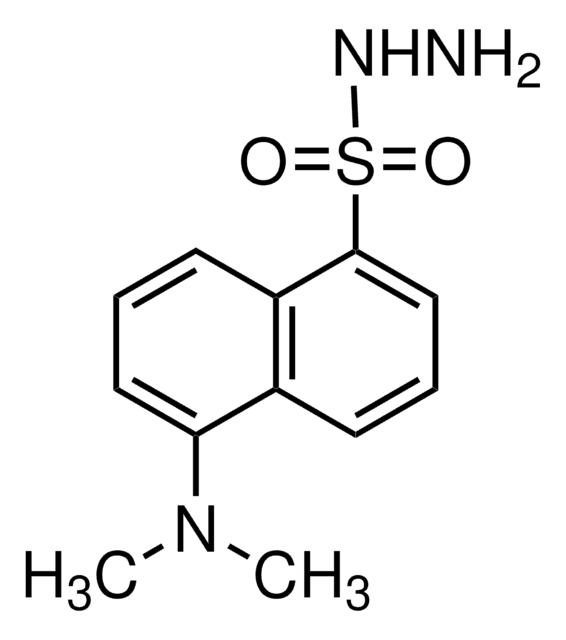46985
Fluorescein-5-thiosemicarbazide
suitable for fluorescence, ~80% (HPCE)
About This Item
Recommended Products
Assay
~80% (HPCE)
form
solid
solubility
DMF: soluble
H2O: soluble
fluorescence
λex 492 nm; λem 516 nm in 0.1 M Tris pH 9.0
suitability
suitable for fluorescence
storage temp.
−20°C
SMILES string
NNC(=S)Nc1ccc(c(c1)C(O)=O)C2=C3C=CC(=O)C=C3Oc4cc(O)ccc24
InChI
1S/C21H15N3O5S/c22-24-21(30)23-10-1-4-13(16(7-10)20(27)28)19-14-5-2-11(25)8-17(14)29-18-9-12(26)3-6-15(18)19/h1-9,25H,22H2,(H,27,28)(H2,23,24,30)
InChI key
MEUCHQDLZYLNQY-UHFFFAOYSA-N
General description
Application
- Cell-surface functional groups (glycophorins) in the study of the effect of deoxygenation in the red blood cell membrane.
- Saccharides applicable in polysaccharide imaging in live cells.
- Chondroitin sulfate nanogels applicable in cell-specific drug delivery applications.
Features and Benefits
- It displays strong fluorescence property.
- Shows an intrinsic reactivity of the thiosemicarbazide group towards the aldehyde group.
Storage Class Code
11 - Combustible Solids
WGK
WGK 3
Flash Point(F)
Not applicable
Flash Point(C)
Not applicable
Personal Protective Equipment
Certificates of Analysis (COA)
Search for Certificates of Analysis (COA) by entering the products Lot/Batch Number. Lot and Batch Numbers can be found on a product’s label following the words ‘Lot’ or ‘Batch’.
Already Own This Product?
Find documentation for the products that you have recently purchased in the Document Library.
Customers Also Viewed
Our team of scientists has experience in all areas of research including Life Science, Material Science, Chemical Synthesis, Chromatography, Analytical and many others.
Contact Technical Service












